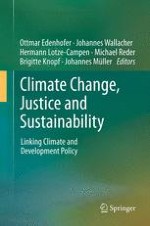2012 | OriginalPaper | Buchkapitel
13. Climate Change Mitigation: Options, Costs and Risks
verfasst von : Brigitte Knopf, Martin Kowarsch, Ottmar Edenhofer, Gunnar Luderer
Erschienen in: Climate Change, Justice and Sustainability
Verlag: Springer Netherlands
Aktivieren Sie unsere intelligente Suche, um passende Fachinhalte oder Patente zu finden.
Wählen Sie Textabschnitte aus um mit Künstlicher Intelligenz passenden Patente zu finden. powered by
Markieren Sie Textabschnitte, um KI-gestützt weitere passende Inhalte zu finden. powered by
